 W
WAssyrian cuisine is the cuisine of the indigenous ethnic Assyrian people, Eastern Aramaic-speaking Syriac Christians of Iraq, northeastern Syria, northwestern Iran and southeastern Turkey. Assyrian cuisine is primarily identical to Iraqi/Mesopotamian cuisine, as well as being very similar to other Middle Eastern and Caucasian cuisines, as well as Greek cuisine, Levantine cuisine, Turkish cuisine, Iranian cuisine, Israeli cuisine, and Armenian cuisine, with most dishes being similar to the cuisines of the area in which those Assyrians live/originate from. It is rich in grains such as barley, meat, tomato, herbs, spices, cheese, and potato as well as herbs, fermented dairy products, and pickles.
 W
WAbgoosht is an Iranian stew. It is also called dizi in Iran and chainaki in Afghanistan, which refers to the traditional stoneware crocks it is served in. Some describe it as a "hearty mutton Persian soup thickened with chickpeas."
 W
WAmba or anba is a tangy mango pickle condiment of Iraqi-Jewish and Kurdish-Jewish origin, that is also popular in Israeli cuisine. It is typically made of pickled green mangoes, vinegar, salt, turmeric, chili and fenugreek. It is somewhat similar to savoury mango chutneys.
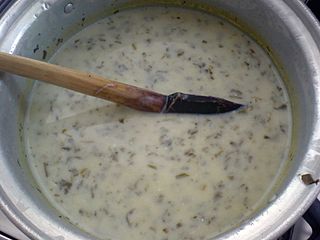 W
WAsh-e doogh,, also known as "yogurt soup", originates from the Azeri region of northwest Iran and is one of the traditional soups of Ardabil. It is a common dish found in many regions and cultures within West Asia, including Iran, Azerbaijan, and Turkey.
 W
WAush jushpare is a type of aush, commonly cooked in Khorasan, Gonabad, Ferdous and Sabzevar in Iran.it is similar to the Chinese Jiaozi Historian Bayhaqi (-1077) mentioned about Aush Jushpare in his book "Tarikh-i Bayhaqi". Aush Jushpare is one of the oldest Aush, but since it takes a lot of time for preparation, it is not commonly eaten now. It is rather a dish of hospitality, which people eat on the occasion of special gatherings or festivals. Traditional guest house restaurant serves Aush Jushpare as local specialty. Aush Jushpare was registered as intangible heritage of Iran in 5 January 2021.
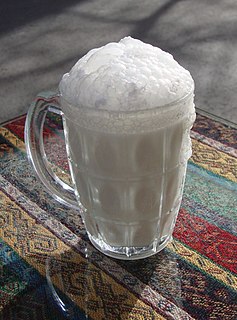 W
WAyran, doogh, Dhallë, or tan is a cold savory yogurt-based beverage, popular across Western Asia, Central Asia, South Asia, Southeastern Europe and Eastern Europe. The principal ingredients are yogurt, water and salt. Herbs such as mint may be optionally added. Some varieties are carbonated.
 W
WBaba ghanoush, also spelled baba ganoush or baba ghanouj, is a Levantine appetizer of Lebanese origin consisting of mashed cooked eggplant, olive oil, lemon juice, various seasonings, and sometimes tahini. It may be served with onions, tomatoes, or other vegetables. The eggplant is traditionally baked or broiled over an open flame before peeling, so that the pulp is soft and has a smoky taste. It is a typical meze ('starter') of the regional cuisine, often served as a side to a main meal and as a dip for pita bread.
 W
WBörek is a family of baked filled pastries made of a thin flaky dough such as phyllo or yufka, typically filled with meat. It is found in the cuisines of Western Asia, the Balkans, the South Caucasus, the Levant, Central Asia, and other parts of Eastern Europe. A börek may be prepared in a large pan and cut into portions after baking, or as individual pastries. The top of the börek is occasionally sprinkled with sesame or nigella seeds.
 W
WBulgur is a cereal food made from the cracked parboiled groats of several different wheat species, most often from durum wheat. It originates in Middle Eastern cuisine.
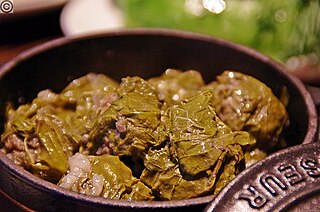 W
WDolma is a family of stuffed dishes found in the Balkans, South Caucasus, Central Asia and the Middle East, in which a vegetable or leaf is used as a container or wrapping for another food used as a filling. Common vegetables for stuffing are tomato, pepper, onion, zucchini, eggplant and pointed gourd. Stuffed cabbage rolls and vine leaves are also very popular, which are sometimes also called sarma. Meat dolmas are generally served warm, often with tahini or avgolemono sauce. Dolmas prepared with olive oil and stuffed with rice are generally served cold with a garlic-yogurt sauce.
 W
WDried lime tea, also known as chai noomi basra, noomi basra tea or loomi tea, is a type of herbal tea made from dried limes that is traditional to the Arab states of the Persian Gulf and Iraq.
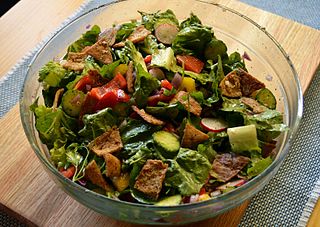 W
WFattoush is a Levantine salad made from toasted or fried pieces of khubz combined with mixed greens and other vegetables, such as radishes and tomatoes.
 W
WKanafeh is a traditional Middle Eastern dessert made with shredded filo pastry, or alternatively fine semolina dough, soaked in sweet, sugar-based syrup, and typically layered with cheese, or with other ingredients such as clotted cream or nuts, depending on the region. It is popular in the Arab world, particularly the Levant and Egypt, and especially among Palestinians. In addition, variants are found in Turkey, Greece, and the Balkans, as well as in the South Caucasus such as Armenia and Azerbaijan.
 W
W[[File:Khash.jpg|thumb|right|
 W
WKleicha is sometimes considered the national cookie of Iraq. It is also found in Saudi Arabia.
 W
WKofta is a family of meatball or meatloaf dishes found in the Indian subcontinent, South Caucasian, Middle Eastern, Balkan, and Central Asian cuisines. In the simplest form, koftas consist of balls of ground meat - usually beef, chicken, lamb or mutton, pork, or a mixture - mixed with spices or onions. In Muslim cultures, pork is not commonly used. In many areas in India, beef is not commonly used. In Greece and Cyprus, vegetarian versions are known as hortokeftedes, and often eaten during fasting periods such as Lent. An uncooked version is also made in Turkey, called çiğ köfte. In India, vegetarian varieties may use potato, calabash, paneer, or banana. In Europe, kofta is often served in a fast-food sandwich in kebab shops.
 W
WLahmacun is a round, thin piece of dough topped with minced meat, minced vegetables and herbs including onions, garlic, tomatoes, red peppers, and parsley, and spices such as chili pepper, paprika, and cinnamon, then baked. Lahmacun is often wrapped around vegetables, including pickles, tomatoes, peppers, onions, lettuce, parsley, and roasted eggplant.
 W
WLavash is a thin flatbread usually leavened, traditionally baked in a tandoor (tonir) or on a sajj, and common to the cuisines of South Caucasus, Western Asia, and the areas surrounding the Caspian Sea. Lavash is one of the most widespread types of bread in Armenia, Azerbaijan, Iran and Turkey. The traditional recipe can be adapted to the modern kitchen by using a griddle or wok instead of the tonir.
 W
WMasgouf, is a Mesopotamian dish consisting of seasoned, grilled carp; it is often considered the national dish of Iraq.
 W
WPaska is a Ukrainian Easter bread tradition and particularly spread in countries with predominant Eastern Orthodox religious or cultural connections to the ancient Byzantine Empire. Paska breads are a traditional element in the Easter holidays of Ukraine, Armenia, Belarus, Romania, Russia, Georgia, Moldova and parts of Bulgaria, as well as Turkey, Iran and the Assyrian–Chaldean–Syriac diaspora. Due to its geographical closeness, it is also widespread in Slovakia. Meanwhile it is also eaten in countries with immigrant populations from Eastern Europe such as the United States, Canada and the United Kingdom.
 W
WIraqi samoon or stone samoon is a type of yeast bread that is consumed mainly in Iraq. It is baked in traditional stone ovens, like pizza. This bread is one of the most widespread breads in Iraq, along with khubz. It is usually served with a variety of foods such as hummus, kebab, and shawarma. It is one of the most popular breads used in Iraq and across the Levant and variants can be found in Syria and Lebanon. It can be also found in other Middle Eastern countries such as Kuwait and Saudi Arabia.
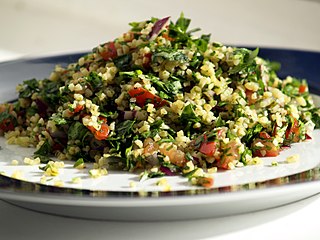 W
WTabbouleh is a Levantine vegetarian salad made mostly of finely chopped parsley, with tomatoes, mint, onion, bulgur, and seasoned with olive oil, lemon juice, salt and sweet pepper. Some variations add lettuce, or use semolina instead of bulgur.
 W
WTepsi baytinijan is a popular Iraqi casserole dish consisting of eggplants, which are sliced and fried before placing in a baking dish, accompanied with meatballs, tomatoes, onions and garlic. Potato slices are placed on top of the mixture, and the dish is baked.
 W
WTorshi are the pickled vegetables of many Middle Eastern and Balkan cuisines.
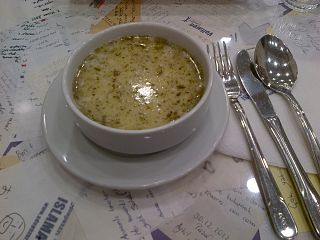 W
WYayla çorbası also known as Turkish: yoğurtlu çorba, lit. 'yogurt soup'), a meal of Turkish cuisine. It is a yogurt soup cooked with a variety of herbs, rice, and (sometimes) chickpeas. It is also a common dish among Assyrians.